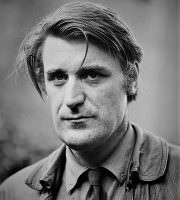About Ted Hughes
Ted Hughes (Edward James Hughes, August 17, 1930 - October 28, 1998), was an English poet and writer, widely recognized as one of the greatest poets of his generation. In the UK, Ted Hughes was Poet Laureate (the Queen's Poet Laureate) from 1984 until his death in 1998. After graduating, Hughes worked for a few years as a gardener, zookeeper, night watchman and film studio editor before publishing his first book of poetry, The Hawk in the Rain, in 1957, with which he gained international acclaim. In 1960 Hughes published his second volume of poetry, entitled Lupercal, in which he endeavored to destroy all forms of romanticizing, sentimental poetry in order to poignantly characterize human behavior toward animals. For the work he received the Hawthornden Prize in 1961. In 1967 he published his anthology Wodwo with poems and short stories, the title of which is taken from the chivalric romance Sir Gawain and the Green Knight and corresponds in meaning to a forest spirit. In this volume, Hughes studies in the fields of mythology, ethnology and the occult sciences are reflected in a special way, as well as his reading of Robert Graves The white goddess (1948). After his first works, Hughes published other important volumes of poetry and children's books. His cycle of poems, Crow, first published in 1970. From the Life and Songs of the Crow, which also includes the poem Crow's First Lesson, is one of the most important works of English poetry of the 20th century. It represents Hughes most ambitious attempt, with a large-scale new myth creation in the Crow poems, to invalidate and refute the traditional Christian conception of the love of God with a mythical counter-image, in order to present the actual reality of modernity with its destructive forces in an appropriate modern way to express poetic form. Crow is a trickster figure who simultaneously represents God, God's adversary, demon and animal. In its brutality, Crow is reminiscent of literary figures such as Shakespeare's King Lear or Seneca's tragedy Oedipus, which Hughes had previously edited. While this collection of poems initially resembles an anti-theodicy, it is only towards the end that a fundamental trust in the power of life becomes noticeable. In Gaudette, published in 1977, Hughes mixes prose and poetry and chooses a basic narrative structure. The story is about the Anglican pastor Nicholas Lumb, who is kidnapped by ghosts and replaced by a double. In 1975's Cave Birds, Hughes once again worked with mystical elements, while in 1979's Remains of Elmet he drew on photographs by Fay Godwin, which attempted to capture the landscapes of Yorkshire. In the volumes Moortown (1979) and River (1983), Hughes focuses primarily on the regenerative power of nature as a permanent element.Ted Hughes is particularly known for his marriage (1956–1963) to the American poet Sylvia Plath, in the sense that he was often accused by critics of being behind the suicide of his wife in 1963 (thus than the suicide of his mistress Assia Wevill in 1969). He explored his complex relationship with Sylvia Plath in his last collection of poems, Birthday Letters, which appeared in 1998, a few months before his death. The book was crowned the same year by the Whitbread Book — a prize he had also received the previous year for Tales from Ovid. Birthday Letters can be understood as a coming to terms with his relationship with Sylvia Plath. It became a bestseller and won numerous awards. Shortly before his death, Hughes was inducted by Queen Elizabeth II into the prestigious Order of Merit, whose regular membership is limited to just 24 people. In the same year he was awarded the T. S. Eliot Prize.
During his lifetime, Hughes always considered his poetry to be autonomous and distanced himself from attempts to view his poetry from an autobiographical perspective. However, in a series of letters to the critic Keith Sagar, which were only published posthumously, he explains that at the time the Crow poems were written, they were an expression of his sadness and pain after the most devastating event in the world felt in his life, Sylvia Plath's suicide. Although born out of this pain, Hughes abruptly ended the poetry cycle he had started in 1969 after the death of his lover Assia and their daughter Shura. The published work edition of the Crow poems is dedicated to Assia and Shura.
Ted Hughes died of a heart attack on October 28, 1998 at the age of 68 after suffering from cancer. His funeral service was held in North Tawton, after which he was cremated in Exeter. His ashes were scattered on Dartmoor.
Browse all poems and texts published on Ted Hughes
The inmost spirit of poetry, in other words, is at bottom, in every recorded case, the voice of pain – and the physical body, so to speak, of poetry, is the treatment by which the poet tries to reconcile that pain with the world.









